Talks with U.S. will lead to more pressure on Iran: interior minister

TEHRAN - Interior Minister Abdolreza Rahmani Fazli said on Sunday that in the current situation, talks with the U.S. will lead to more pressure on Iran.
“We should boost resistance. They should come to the conclusion that they have no other way but to get along with us. They put pressure on us through oil, assuming that they can reduce oil sale to zero. However, the Islamic Republic of Iran will stand against them,” he said during a conference.
He noted that Iran will not negotiate with the U.S. given its “cruel pressure” and violation of the 2015 nuclear deal.
On July 31, 2018, Trump offered to meet Iran’s leaders with “no preconditions” and “any time they want”.
"I'd meet with anybody. I believe in meetings," Trump told reporters at the White House.
In remarks on April 29, President Hassan Rouhani likened Trump to a knifeman with whom Iran will not negotiate. “Undoubtedly, accepting the demands of a knifeman who through bullying and lying is seeking negotiation will get nowhere,” Rouhani said.
Also, in remarks on August 13, 2018, Leader of the Islamic Revolution Ayatollah Ali Khamenei said there will be no negotiation between the two countries.
The Leader noted that as Imam Khomeini “banned talks with the U.S. I also ban it”. He added that negotiation with the current U.S. administration is impossible. “Even if we were to negotiate with America, we would never hold talks with the current American administration.”
Rouhani said in September 2018 that the Trump administration constantly sends messages to Iran to begin negotiations.
“From one side, they put pressure against the Iranian people and on the other side they send us messages through various methods that we should come and negotiate together,” he said.
Iranian Majlis Speaker Ali Larijani said on April 29 that talks with the U.S. is a “strategic mistake”.
“U.S. officials should know that they are facing a tough opponent,” Larijani said during a conference on monetary policies.
U.S. President Donald Trump unilaterally pulled Washington out of the 2015 nuclear deal in May 2018 and ordered reimposition of sanctions against Iran. The first round of sanctions went into force on August 6 and the second round, which targets Iran’s oil exports and banks, were snapped back on November 4. In November the U.S. allowed sanctions waivers for countries such as China, India and Turkey to continue importing oil from Iran, however it announced on April 22 that if any country buys oil from Iran it will be sanctioned.
Larijani said Iran sat at the negotiating table for 12 years that finally produced the nuclear deal, officially known as the JCPOA, but Trump revoked it.
NA/PA
